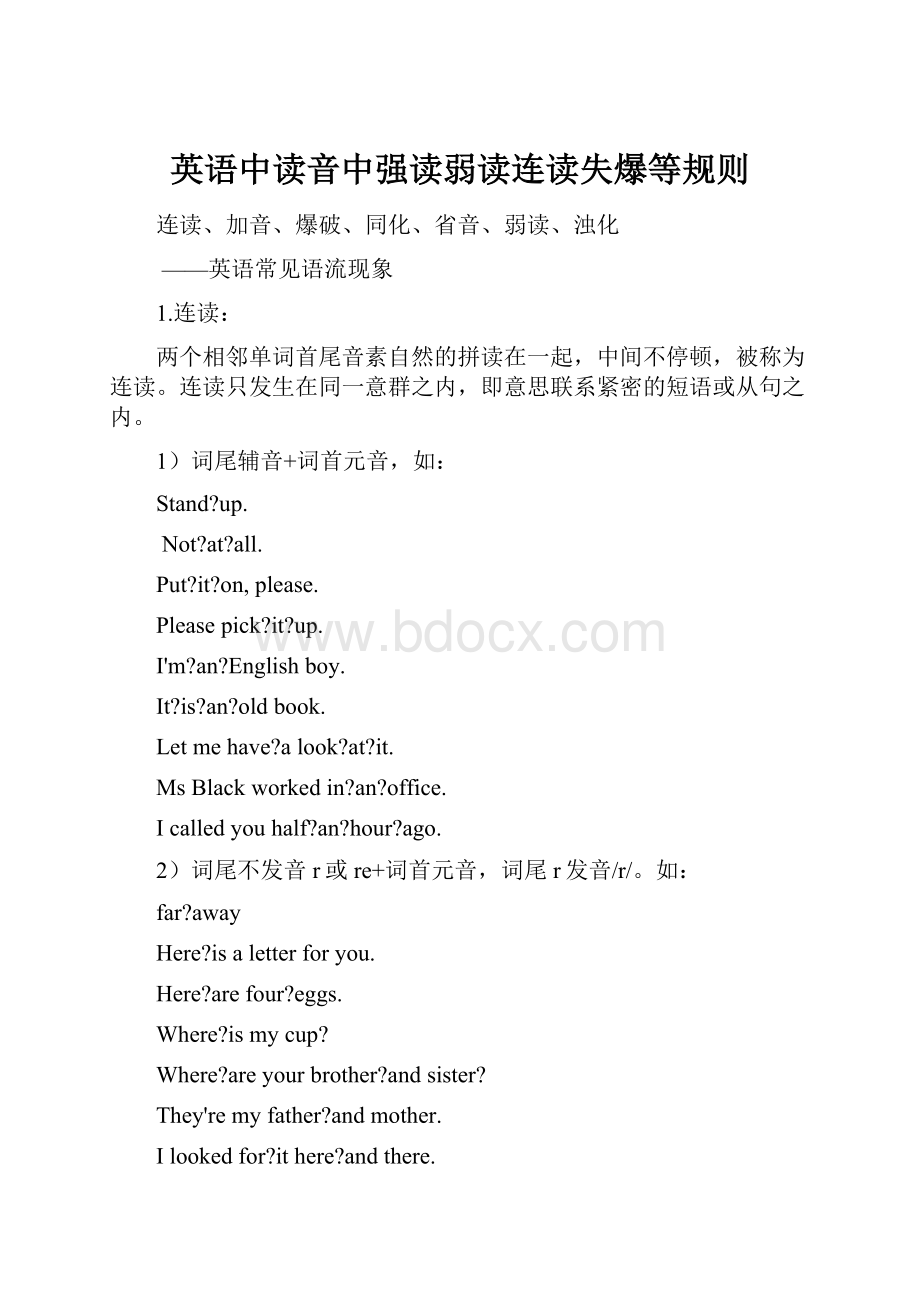英语中读音中强读弱读连读失爆等规则.docx
《英语中读音中强读弱读连读失爆等规则.docx》由会员分享,可在线阅读,更多相关《英语中读音中强读弱读连读失爆等规则.docx(9页珍藏版)》请在冰豆网上搜索。

英语中读音中强读弱读连读失爆等规则
连读、加音、爆破、同化、省音、弱读、浊化
——英语常见语流现象
1.连读:
两个相邻单词首尾音素自然的拼读在一起,中间不停顿,被称为连读。
连读只发生在同一意群之内,即意思联系紧密的短语或从句之内。
1)词尾辅音+词首元音,如:
Stand?
up.
Not?
at?
all.
Put?
it?
on,please.
Pleasepick?
it?
up.
I'm?
an?
Englishboy.
It?
is?
an?
oldbook.
Letmehave?
alook?
at?
it.
MsBlackworkedin?
an?
office.
Icalledyouhalf?
an?
hour?
ago.
2)词尾不发音r或re+词首元音,词尾r发音/r/。
如:
far?
away
Here?
isaletterforyou.
Here?
arefour?
eggs.
Where?
ismycup?
Where?
areyourbrother?
andsister?
They'remyfather?
andmother.
Ilookedfor?
ithere?
andthere.
There?
isafootballunder?
it.
There?
aresomebooksonthedesk.
注:
当有意群进行停顿时不可连读。
如:
Is?
itahator?
acat?
(hat与or之间不可以连读)
There?
is?
agoodbookinmydesk.(book与in之间不可以连读)
Canyouspeak?
EnglishorFrench?
(English与or之间不可以连读)
Shallwemeetat?
eightortentomorrowmorning?
(meet与ateight与or之间不可以连读)
Sheopenedthedoorandwalked?
in.(door与and之间不可以连读)
2.加音:
在连贯的语流中,人们往往会在两个元音之间加入一个外加音帮助发音,从而更加流畅地表达意思。
1)词尾元音/?
u:
/+词首元音在词尾加上一个轻微的/w/。
Gowaway.
Howwandwhydidyoucomehere?
Thequestionistooweasyforhimtoanswer.
2)词尾元音/?
i:
/+词首元音在词尾加上一个轻微的/j/。
如:
IjamChinese.
Shecan'tcarryjit.
Ijalsoneedthejotherone.
Hejisveryfriendlytome.
ShewantstostudyjEnglish.
It'lltakeyouthreejhourstowalkthere.
3.失去爆破与不完全爆破:
1)失去爆破:
爆破音+爆破音
当两个爆破音/p,b,t,d,k,g/相邻时,前一个爆破音只按其发音部位做好发音口形、形成阻碍而不爆破出来,稍微停顿后即发出后面的辅音。
前一个爆破音被称为失去爆破。
失去爆破产生的原因大体上是由于省力原则造成的。
如:
Kept/Blackboard/Notebook/Goodbye/September/Suitcase/Bigboy/Sharppencil
Whattime
Youmustpay.
AskBobtositbehindme.
Shetookgoodcareofthechildren.
2)不完全爆破:
A)爆破音+摩擦音:
爆破音/p,b,t,d,k,g/与摩擦音/f,v,s,z,?
?
θ,e,r,h/相邻时产生不完全爆破。
发摩擦音时发音器官并不形成阻碍而只形成一个很狭小的缝隙让气流从缝隙中摩擦而出。
如果一个爆破音与摩擦音相接它爆破冲出的气流只能从狭小的缝隙中通过这种爆破是不完全的。
失去爆破产生的原因大体上是由于省力原则造成的。
如:
Advance/Success
Agoodview
Oldfriends
Justthen
Getthrough
Makesure
Nightshow
Keepsilence
Keepthatinmind
B)爆破音+破擦音:
爆破音与破擦音/t?
d?
tr,dr/相邻时产生不完全爆破。
如Picture/Object
Thatchild
Goodjob
Sweetdream
Greatchanges
Afasttrain
C)爆破音+鼻辅音:
爆破音与鼻辅音/m,n,?
/相邻时:
在词中,不完全爆破;在词尾鼻腔爆破。
如:
Utmost/Admit/Midnight/Certain/Button/Garden
Goodmorning
Goodnight
Startnow
Idon’tknow
Justmoment
Agoodneighbor
D)爆破音+边辅音:
爆破音与边辅音/l/相邻时:
在词中,不完全爆破;在词尾舌侧爆破。
如:
Lately/Badly/Mostly/Friendly
Abitlouder
I’dliketo
Straightline
Goodluck
Atlast
Atlunch
4.同化:
人们在说话的时往往会不自觉地让一个音受相邻音的影响,使它们变得与其相同或相似;或者两个音互相影响变为第三个音。
这两种现象被称为音的同化。
同化可以发生在同一个词、复合词内或者句子相邻词之间。
1)因声带的影响而发生的同化:
A)浊辅音可变为清辅音,如:
of(v→f)coursehis(z→s)penwith(e→θ)pleasure。
B)清辅音可变为浊辅音,如:
like(k→g)that。
2)因发音部位的影响而发生的同化:
A)/t/+/j/→/t?
/。
如:
Don’thurtyourself!
I’llletyougothistime.
Don’tyoudothatagain.
It’sverynicetomeetyou.
B)/d/+/j/→/d?
/。
如:
Didyoursistercome?
Wouldyoupleasecomein?
Couldyoureadthisformeplease?
Youdidn’tlikeEnglish,didyou?
C)/s/+/j/→/?
/。
如:
Imissyou.
MayGodblessyou.
Wewillcomethisyear.
D)/z/+/j/→/?
/。
如:
Here’syourticket.
Iloveyoubecauseyouareyou.
Don’texpecthetellsyouthetruth
5.省音:
在快速、随便的言语中一些音素被省略掉被称为省音。
省音能提高语速,使说话省力。
在正式场合和语速慢的情况下,省音不是必须的。
1)同一单词内元音的省略,主要是非重读音节中的/?
/和/?
/,如:
ord(i)n(a)ry。
2)当前一单词以辅音结尾,后一单词以/?
/开头时,/?
/常被省略,如:
walk(a)way。
3)当前一单词以否定形式-n't结尾,后一单词以辅音开头时,/t/常被忽略,如:
Sheisn’(t)there.
Ididn’(t)hearyou.
Hecan’(t)believethat.
4)任何一个辅音若后面紧跟着/h/,/h/可以不发音。
如:
Come(h)ere!
Must(h)e/ti/go?
Whatwill(h)e/wili/do?
Has(h)edoneitbefore?
Tell(h)imtoask(h)er…
5)将多个单词利用连读爆破等拼和在一起。
如:
gotta(gotto)
gonna(goingto)
kinda(kindof)
lotsa(lotsof)
gimme(giveme)
6.强读式和弱读式:
在一个句子,有些词说得又轻又快,而且较为含糊,有些词则说得又重又慢,而且较为清晰。
那些说得响亮而清晰的词就是句子重音所在。
实词(包括名词、实义动词、形容词、副词、数词疑问词等)一般都接受句子重音,为重读词,采用强读式:
虚词(包括介词、代词、连词、冠词、助动词、情态动词等功能词)一般都不接受句子重音,为非重读词,采用弱读式。
一般规律:
1)弱读式只出现在句子的非重读词中。
如:
Passme/m?
/the/e?
/book.me、the弱读。
2)单词单独出现或在句首或句尾时,都采用强读式。
如:
Whatareyoulisteningto/tu:
/?
3)被特别强调的词无论实词还是虚词都采用强读式。
如:
Iam/?
m/Peter.我就是皮特。
虚词弱读规律:
1)长音变短音,如:
she/?
i:
/弱读/?
?
/。
2)元音前面的辅音被省略,如:
him/h?
m/弱读/?
m/。
3)辅音前面的元音被省略,如:
am/?
m/弱读/m/。
4)元音一般弱读为/?
/,如:
can/k?
n/弱读/k?
n/。
5)部分虚词有多种弱读式,如:
would/w?
d/弱读/?
d,d/。
7.浊化:
1)/s/后面的清辅音要浊化。
如:
/k/浊化成/g/:
scar/school/discussion
/t/浊化成/d/:
stand/student/mistake
/p/浊化成/b/:
spring/spirit/expression
2)美音中,当/t/出现在两个元音之间并且处于非重读位置的时候,/t/需要浊化成一个近似于/d/的音。
这样,writer听起来和rider的发音几乎没有区别。
如:
Letter/water/better/duty/bitter/city
Igotit.
Wouldyoupleasepickitup?
注:
/t/如果处于重读位置的话,即使在两个元音之间也不需要浊化。
请比较:
清晰的/t/浊化的/t/
I'talian'Italy
a'tomic'atom
La'tino'Latin
pho'tographer'photograph
3)美音中,当/t/前面是一个元音,后面是一个模糊的/l/,且处于非重读位置,/t/也需要浊化成一个近似于/d/的音。
如:
Battle/bottle/cattle/little/rattle/settle
4)美音中,当/t/前面是一个清辅音或前鼻音/n/,后面是一个元音,且处于非重读位置,/t/也需要浊化成一个近似于/d/的音。
如:
Twenty/fifty/center/after/faster/actor/sister/yesterday
朗读练习:
1.Therearemanythingstoconsiderwhenyouarelookingforahouse,whetheryouintendtobuyoronlyrent.Afterall,itisgoingtobeyourhome,perhapsforquitealongtime,andyouwanttobehappywithit.Youhavetodecideexactlywhatkindofhouseyouwant,howmuchyoucanaffordtopay,andthetypeofneighborhoodyouwishtolivein.However,it’salwayseasytoforgetallabove,becauseit’smostprobablythatyou’llfallinlovewiththehouseforsaleatthefirstsight.
2.Youth
Youthisnotatimeoflife;itisastateofmind;itisnotamatterofrosycheeks,redlipsandsuppleknees;itisamatterofthewill,aqualityoftheimagination,avigoroftheemotions;itisthefreshnessofthedeepspringsoflife.
Youthmeansatemperamentalpredominanceofcourageovertimidity,oftheappetiteforadventureovertheloveofease.Thisoftenexistsinamanofsixtymorethanaboyoftwenty.Nobodygrowsoldmerelybyanumberofyears.Wegrowoldbydesertingourideals.
Yearsmaywrinkletheskin,buttogiveupenthusiasmwrinklesthesoul.Worry,fear,self-distrustbowstheheartandturnsthespiritbacktodust.
Whethersixtyorsixteen,thereisineveryhumanbeing'sheartthelureofwonder,theunfailingchildlikeappetiteforwhat'snext,andthejoyofthegameofliving.Inthecenterofyourheartandmyheartthereisawirelessstation;solongasitreceivesmessagesofbeauty,hope,cheer,courageandpowerfrommenandfromtheInfinite,solongareyouyoung.
Whentheaerialsaredown,andyourspiritiscoveredwithsnowsofcynicismandtheiceofpessimism,thenyouaregrownold,evenattwenty;butaslongasyouraerialsareup,tocatchthewavesofoptimism,thereishopeyoumaydieyoungateighty.